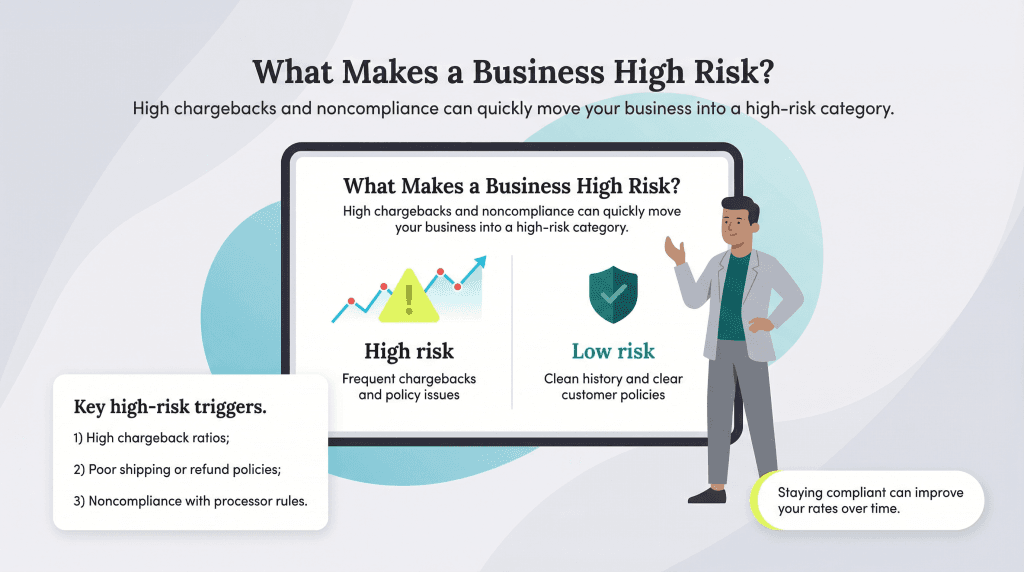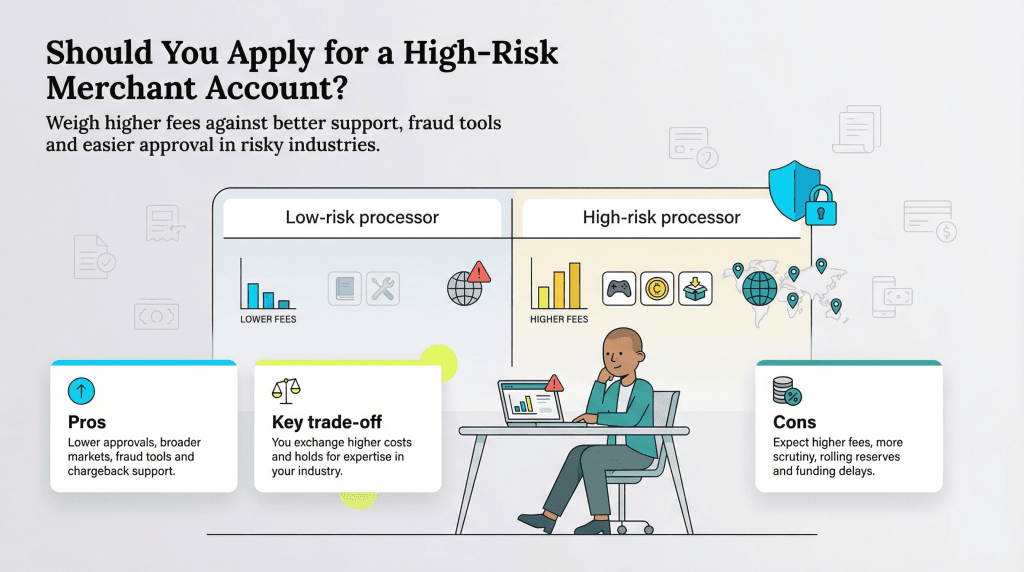Business.com aims to help business owners make informed decisions to support and grow their companies. We research and recommend products and services suitable for various business types, investing thousands of hours each year in this process.
As a business, we need to generate revenue to sustain our content. We have financial relationships with some companies we cover, earning commissions when readers purchase from our partners or share information about their needs. These relationships do not dictate our advice and recommendations. Our editorial team independently evaluates and recommends products and services based on their research and expertise. Learn more about our process and partners here.
Credit Card Processing in High-Risk Industries
Consumers expect to pay with credit and debit cards, but finding a credit card processor in certain industries can be challenging. Here are the pros and cons of a high-risk merchant account.

Table of Contents
Businesses in what are considered “high-risk” industries can have a hard time finding a credit card processor or merchant account provider to handle their payments — and when they do find one, they may be subject to stringent requirements or have to pay higher fees.
We’ll break down which industries are considered high-risk, explain why that matters and walk you through the pros and cons of working with a high-risk merchant account provider.
What is a high-risk merchant account in credit card processing?
A high-risk merchant account is a type of payment processing account assigned to businesses that are more likely to experience chargebacks, refunds or credit card fraud or operate in industries considered unstable or legally complex. These accounts typically come with higher fees and stricter contract terms because they pose more liability for credit card processors and banks.
Editor’s note: Looking for the right credit card processor for your business? Fill out the below questionnaire to have our vendor partners contact you about your needs.
Businesses classified as high-risk may be required to maintain a rolling reserve — a portion of your credit card sales that the processor temporarily holds as a buffer against potential disputes or chargebacks.
Which industries are considered high risk?
Factors that may classify a business or its industry as “high risk” include:
- Heavily regulated or controversial sectors. Businesses that face legal scrutiny and frequent business lawsuits represent higher liability and a greater risk of business failure.
- Inconsistent revenue. This includes businesses that are seasonal or highly dependent on consumer spending trends.
- Large upfront deposits. Businesses that require large payments ahead of the product or service being delivered are considered high risk, according to Phillip Parker, founder of CardPaymentOptions.com.
- Newer industries with evolving regulations. Some businesses are labeled high risk because they’re operating in newer markets that are “not well understood both from a transaction risk point of view, as well as government policy and regulation standpoint,” Parker explained.
Businesses commonly considered high risk by most lenders include:
- Weapons manufacturers and retailers
- Tobacco, alcohol and cannabis
- Gambling and sports betting
- Adult entertainment and content
- Travel agencies and tour operators
- Health supplements and pharmacies
- Forex, payday lending and check cashing services
- Debt collectors and auctioneers
- Dating services
- Businesses with a subscription model
- Cryptocurrency and forex trading
- E-commerce (dropshipping, online electronic goods and international retail)
What makes a business high risk?

The best credit card processors abide by specific classifications for high-risk merchants. Here’s an overview of what may land you in the high-risk credit card processing category as opposed to the low-risk one:
High risk | Low risk |
|---|---|
$20,000 or more in monthly transactions | Less than $20,000 in monthly sales |
Average transaction of $500 or more | Average transaction of less than $500 |
High-risk industry (forex, gambling, travel) | Low-risk industry, such as clothing, home goods or books) |
Excessive chargebacks and disputes | Low chargeback ratio (less than 0.9 percent of total transactions) |
Accepts multiple currencies as payment | Only accepts one currency as payment |
Offers recurring payment options (subscriptions) | Conducts single transactions only (no subscriptions) |
Conducts business internationally | Conducts business only in the United States |
While this table serves as a general guide, whether your business is categorized as high risk or low risk is ultimately up to the credit card processing company.
Kyle Hall, CEO of PayKings, noted that chargebacks are a major red flag.
“Any business that has high chargeback ratios is also deemed high-risk. This could be due to poor shipping policies, bad product quality or a difficult refund process,” Hall said.
Should I apply for a high-risk merchant account?
If you’re a merchant operating in a high-risk industry, you have two primary options for working with a payment processor:
- Choose a credit card processor that only charges you for transactions processed through your site or app.
- Apply for a high-risk merchant account with a processor experienced in your industry.
It may be difficult to find a credit card processor willing to approve your account. Even after that, you’ll likely face higher processing fees, rolling reserves and stricter contract terms. On the other hand, working with a processor that specializes in high-risk industries means they understand your unique challenges and can offer support tailored to your specific business needs.
Here are a few pros and cons to consider about working with a high-risk credit card processor.

Pros of working with a high-risk credit card processor
- Opportunity to expand your market: High-risk merchants can do business with clients in countries or regions considered high risk, giving you access to broader international markets than many low-risk merchants can tap into. You can also offer a wider range of products and services, including those not allowed by traditional processors, which may boost your revenue potential.
- Chargeback protection: If a low-risk merchant exceeds their chargeback limit, their processor might terminate the account immediately. With a high-risk account, however, the processor is more likely to pause your ability to accept payments temporarily while the issue is resolved.
- Fraud prevention tools: Operating in a high-risk space means you’re exposed to more fraud attempts, but this also drives the development and adoption of better fraud prevention tools. Over time, these tools can help improve your overall security and operations.
- More seamless transaction processing. Hall noted that high-risk merchants can accept payments even in restricted industries. “When you open an account with [a processor] that understands the business model, even if it’s in a high-risk industry, you will be able to process more seamlessly,” Hall explained.
Cons of working in a high-risk credit card processor
- Higher fees and rates: Because high-risk businesses pose a greater liability to credit card processors, they typically pay higher processing rates and fees. “The rates and fees for traditional processing average just over 2 percent of the sale amount, but with a high-risk merchant account, it is very common to see processing fees exceeding 5 percent,” Parker explained.
- More frequent chargebacks: Buyers in high-risk industries, such as online gambling, adult entertainment or expensive subscription services, are more likely to dispute charges. Excessive chargebacks can incur additional fees or even cause your processor to terminate your account.
- Increased exposure to fraud: Businesses that sell high-priced goods or operate online are often targeted by scammers using stolen credit cards. Eventually, these sales will get reversed when discovered by the legitimate cardholder.
- Stricter underwriting and account holds: You’ll likely undergo a more thorough underwriting process when applying for a high-risk merchant account. That may include detailed financial reviews, background checks and additional documentation. Even after approval, processors may impose rolling reserves or hold your funds for longer periods to protect against chargeback-related losses.
No matter which path you choose for credit card processing, the key is to shop around and find a provider with fair, transparent pricing and experience in your field. As a high-risk merchant, it’s best to be prepared for added complexity and choose a processor with experience supporting businesses like yours.









